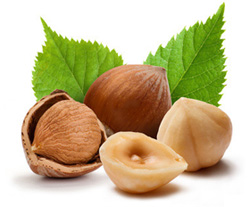SultanasTurkey, Afghanistan, Iran, Uzbekistan
Sultanas are produced from varieties of seedless grapes, dried to concentrate their rich flavour.
Larger than currants but smaller than raisins.
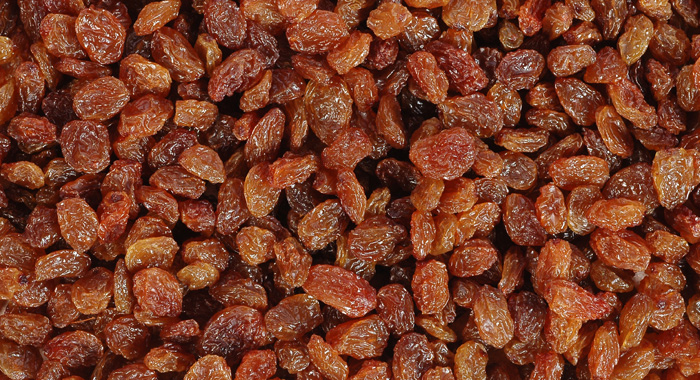
The sultana (also called the sultanina or sultaninini) is a type of white, seedless grape of Turkish, Greek or Iranian origin. In some countries, it is also the name given to the raisin made from it; such sultana raisins are often called simply sultanas or sultanis. These are typically larger than the currants made from Corinthian grapes, but smaller than "normal" raisins. Sultana raisins have a delicate and unique flavour and are especially noted for their sweetness and golden colour.
The sultana differs from the raisin in two ways, one of which is fairly apparent. It is lighter in colour – the lighter the better, in quality terms – but it is also the sun-dried grape of one variety alone, the green, seedless Sultana grape of ancient (possibly Persian) lineage.
The sultana raisin was traditionally imported to the English-speaking world from the Ottoman Empire. According to popular folklore from the Empire, the sultana was invented when the Sultan left his grapes in the sun after fleeing a tiger attack, hence the name sultana, from the feminine form of sultan.
The sultana raisins are classified into five types under the type numbers of 7, 8, 9, 10, 11 where 7 has the darkest and 11 has the lightest color. The raisins are divided into five sizes jumbo, standard, medium, small and small small according to their largeness being.
Hayati Özer manufactures sultana raisins according to the higher global specifications and the final product shall consist of clean, fully developed raisin berries of a general golden appearance. Sultana berries shall be free flowing and facial matter shall be present. In the production stages, raisins are double washed, elaborated, stemmed, capstemmed, brushed, sized, mechanically cleaned and then taken to laser scanning and X-Ray sections. No foreign odours or flavours shall be presented.
Nutritional Information
- Average Values per 100gm (3.5oz)
-
Energy 1241kj 292kcalProtein 2.7gFat 0.4g- Saturated 0.1gCarbohydrate - Total 69.4gSugars 69.1gDietary Fibre 2gCholestrol NilSodium 31mg
Ingredients
- Sultanas (99.5%)
- Vegetable Oil (0.5%)
Storage Conditions
Recommended to store in a cool, dry, clean and well ventilated environment away from strong odours. Ideal storage temperature is between 10-15 degrees Celsius, with relative humidity below 50%.
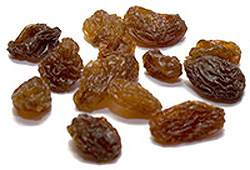
RaisinsTurkey, Afghanistan, Iran, Uzbekistan
Raisins produced from Thompson seedless sultana grape variety
They are directly sun-dried in the open air on cement slabs and a very dark-brown color.
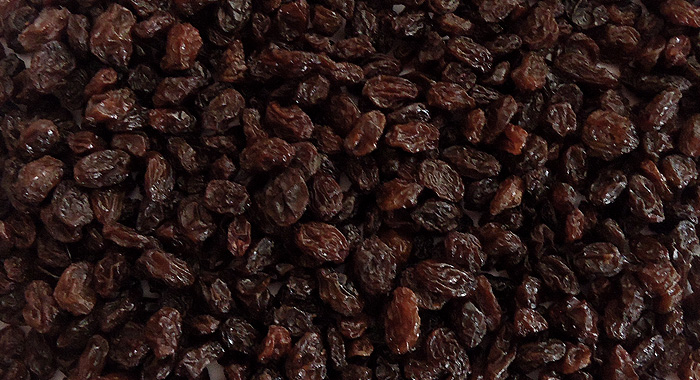
Raisins are dried grapes, with the drying process taking about 15-20 days. Evidence has shown that raisins were produced by the Egyptians as early as 2000 B.C.
Seedless grapes used to make raisins first came from Turkey. In the Aegean Region of Turkey, since the 18th century the major grape production is sultanas, which is a variety of seedless type.
During the late 1800’s Spanish missionaries from Mexico introduced grapes to the USA. These early vineyards were primarily used to make wines, however in 1873 when the vineyards discovered they could make quicker profits by making raisins, the raisin industry was born.
Turkish Thompson Raisins are very popular in world markets with it’s similar taste and odour to Californian style although it’s reasonable prices. This variety is called “Undipped Raisins” as well as they are not dipped to alkaline olive oil emulsion (Potasa) before sun drying which makes the drying period longer than conventional products. Hayati Özer supplies Thompson raisins on a regular basis during the season to it’s wide customer range in the world markets.
The products consists of good, sound berries, typical of the current crop which have been sun dried and stored under satisfactory conditions before processing. The dried fruits are graded and received by Hayati Özer experts and stored in Hayati Özer warehouses under controlled conditions. The fruit will be sized, destemmed, screened, washed in potable water, aspirated and static picked to remove defects and foreign materials.
In the production stages, raisins are double washed, elaborated, stemmed, capstemmed, brushed, sized, mechanically cleaned and then taken to laser scanning and X-Ray sections.
Nutritional Information
- Average Values per 100gm (3.5oz)
-
Energy 1280kj 292kcalProtein 2.3gFat 0.9g- Saturated 0.1gCarbohydrate - Total 71.1gSugars 69.1gDietary Fibre 4.9gCholestrol NilSodium 58mg
Ingredients
- Raisins (99.5%)
- Vegetable Oil (0.5%)
Storage Conditions
Recommended to store in a cool, dry, clean and well ventilated environment away from strong odours. Ideal storage temperature is between 10-15 degrees Celsius, with relative humidity below 50%.
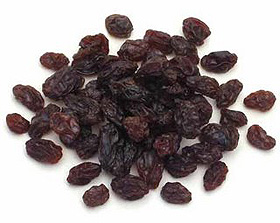
Golden SultanasIran, Uzbekistan
Golden sultanas are obtained by lye dipping and sulphuring sultana grapes, prior to the drying process.
They are golden amber in color with a naturally sweet and fruity flavor.
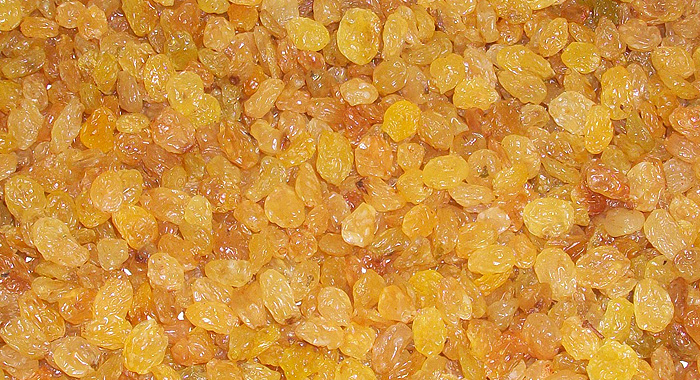
Golden sultanas are Thompson Seedless raisins that have been treated with sulfur dioxide and flame-dried. They are similar in appearance and taste to sultanas, although the latter come from a different variety of grape than do typical dark raisins. Golden raisins are typically encountered in the Western Hemisphere, while sultanas are seen more often in the Eastern.
Hayati Özer Golden Sultanas are grown in the sunny vineyards of Iran and Uzbekistan, so they are golden amber in color with a naturally sweet and fruity flavor.
Our Golden Sultanas are favored by many for cookie, cake, fruitcake, and bread recipes. Or, you can add them to salads and rice or stuffing dishes for a colorful, flavor-filled accent. They are also great eaten right from the box - a quick, fat-free energy boost.
Nutritional Information
- Average Values per 100gm (3.5oz)
-
Energy 1253kj 299kcalProtein 3.4gFat 0.5g- Saturated 0.1gCarbohydrate - Total 63.4gSugars 59.1gDietary Fibre 4.0gCholestrol NilSodium 43mg
Ingredients
- Golden Sultanas (99.5%)
- Vegetable Oil (0.5%)
Storage Conditions
Recommended to store in a cool, dry, clean and well ventilated environment away from strong odours. Ideal storage temperature is between 10-15 degrees Celsius, with relative humidity below 50%.
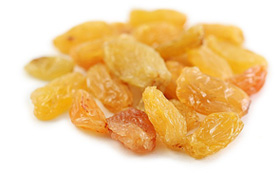
Mixed FruitsTurkey, Afghanistan, Iran, Uzbekistan
The product shall consist of a mixture of sultanas, raisins and currants, mixed with citrus peel.
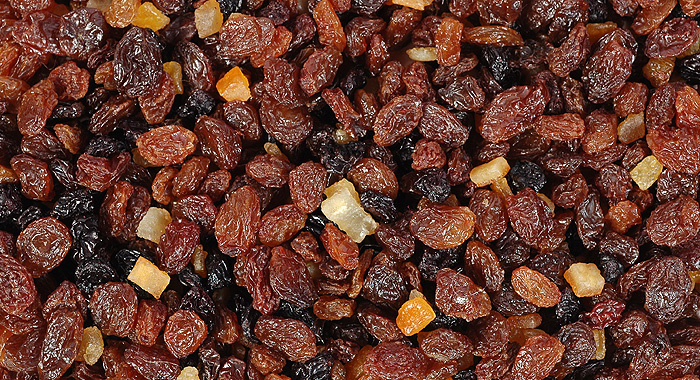
Dried Mixed Fruits and citrus peel. Drying preserves fruit, even in the absence of refrigeration, and significantly lengthens its shelf life. When fresh fruit is unavailable, impractical, or out of season, dried fruit can provide an alternative.
Hayati Özer produces and packages a dry fruit mixture of sultanas, raisins and currants, mixed with candied citrus peel. The product shall have a multicolored appearance from blue/black Corinthian currants, mid-brown sultanas, dark brown raisins, orange and yellow peel.
The product shall have a sweet overall flavor with citrus notes coming from the peel. The texture shall vary from fleshy fruit and citrus peel and sticky glacé dried fruits.
Tradionally used in cake mixes, dried mixed fruits are widely enjoyed especially in the UK and Australia.
Nutritional Information
- Average Values per 100gm (3.5oz)
-
Energy 1280kj 292kcalProtein 2.3gFat 0.9g- Saturated 0.8gCarbohydrate - Total 71.1gSugars 69.1gDietary Fibre 4.9gCholestrol NilSodium 58mg
Ingredients
- Sultanas (30%)
- Raisins (30%)
- Currants (30%)
- Mixed Peel (10%): Orange (80%), Lemon(20%)
Storage Conditions
Recommended to store in a cool, dry, clean and well ventilated environment away from strong odours. Ideal storage temperature is between 10-15 degrees Celsius, with relative humidity below 50%.
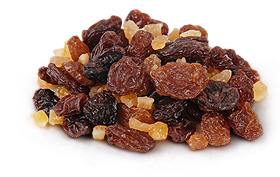
ApricotsMalatya region, Turkey
Dried apricots we supply are prepared from sound, mature, fresh apricots
which have been wasted, cut, pitted, sulfured and sun dried.
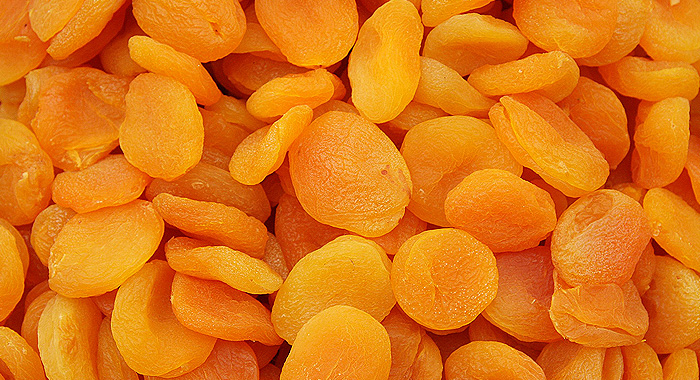
Nearly 4000 years ago, a fruit belonging to the rose family was discovered on the mountain slopes of China. Today, it’s generally accepted that the Chinese first cultivated this ancient fruit, the wild ancestor to the present day apricot.
Turkey is the largest producer and exporter of dried apricots and the majority of the product is coming from Malatya region. The quality and characteristics of the product is unique in the world.
Thorugh our contract manufacturers we are pleased to supply you with the sweetest apricots grow in the valleys of the Malatya region in Turkey. Dried apricots we supply are prepared from sound, mature, fresh apricots which have been wasted, cut, pitted, sulfured and sun dried.
Sweet Malatya apricots are full of flavor, with a delicate aroma. Dried slab apricots are the sweetest and moistest of the bunch -They are being picked up when they are fully ripe, resulting in a natural, sweet flavor and wonderful aroma when dried. They are very moist and delicious.
All dried apricots are mechanically washed and selected. They are oven-dried for the optimum moisture content and checked on lighted belt tables for defects and impurities. In the final phase, dried apricots are inspected and packaged to required sizes.
All our dried apricots are prepared according to Turkish and US FDA Quality Standards by our customer demands. All packaged goods are going through metal detection check up.
Nutritional Information
- Average Values per 100gm (3.5oz)
-
Energy 1118kj 267kcalProtein 25.6gFat 46.7g- Unsaturated 8.2gCarbohydrate - Total 66.7gSugars 53.4gDietary Fibre 7.3gCholestrol NilSodium 10mg
Storage Conditions
Recommended to store in a cool, dry, clean and well ventilated environment away from strong odours. Ideal storage temperature is between 8-12 degrees Celsius, with relative humidity below 50%.
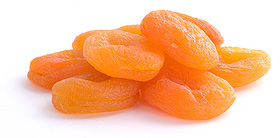
HazelnutsBlack Sea coastline, Turkey
Turkish hazelnut kernels are always available in sufficient quantities and
at high quality and are excellently suited to being processed in the food industry.
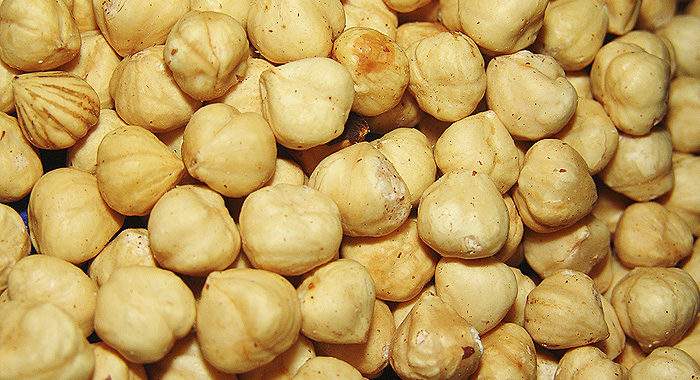
The hazelnut was native to the Black Sea coast long before our era, not as a cultivated product but growing wild on trees or shrubs on the steep slopes of the mountains that are parallel to the coast for hundreds of kilometers from east to west. Historic documents reveal that hazelnuts have been grown along the Black Sea coast in northern Turkey since 300 B.C. Hazelnut farming has been the chief form of livelihood in the region for centuries-as it still is. It is estimated that more than 8 million inhabitans of Turkey depend directly upon the production, marketing or processing of this product. In Turkey, hazelnuts are cultivated in an area of about 550,000-600,000 ha.
Through our contract manufacturers we are pleased to supply you with hazelnuts grow in the Black Sea coastline in Turkey that is one of the few countries in the world having a favourable climate for hazelnut production.
The production area is spread densely all along the Black Sea coast. Hazelnut orchards extend up to 30 km in land. Although the production is greatly affected by climatic conditions, as are most agricultural products, hazelnut production in Turkey is showing an upward trend.
All of our hazelnut products are of highest possible quality. We take extreme care of our product during every stage of growth while control every stage of production and distribution. When you are purchasing from Hayati Özer you can count on receiving the highest quality product available anywhere in the world.
Nutritional Information
- Average Values per 100gm (3.5oz)
-
Energy 2629kj 628kcalProtein 14.95gFat 60.75g- Saturated 4.4gCarbohydrate - Total 16.7gSugars 4.3gDietary Fibre 11gCholestrol NilCalcium 114mg
Storage Conditions
Recommended to store in a cool, dry, clean and well ventilated environment away from strong odours. Ideal storage temperature is between 10-15 degrees Celsius, with relative humidity max 65%.
